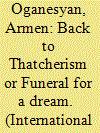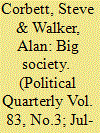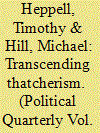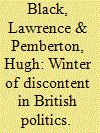|
|
|
Sort Order |
|
|
|
Items / Page
|
|
|
|
|
|
|
| Srl | Item |
| 1 |
ID:
123900


|
|
|
|
|
| Publication |
2013.
|
| Summary/Abstract |
PATROCLUS LAY DEAD while Achaeans and Trojans were still fighting over his body. Today, the controversy over Margaret Thatcher's heritage is going on unabated. The Conservative press has placed the former prime minister on a high pedestal under the slogan Back to Thatcherism. The Labor media, however, firmly relegated the Iron Lady into the past and turned this page of history declaring the former premier forever confined in the narrow British context.
|
|
|
|
|
|
|
|
|
|
|
|
|
|
|
|
| 2 |
ID:
117485


|
|
|
|
|
| Publication |
2012.
|
| Summary/Abstract |
This article contributes to the steady flow of critiques of the big society idea contained in The Political Quarterly. It focuses chiefly on two sets of parallels. The first is between the big society and the policies pursued by the Thatcher government which, despite their obvious rhetorical differences, contain many striking similarities, including their neoliberal origins, application of the 'crowding out' thesis and uncritically idealised notions of community. The second is between the big society and a policy with the same name pursued doggedly by the Chinese Communist Party for nearly 20 years until being abandoned as a failure. Lessons for the Prime Minister's flagship policy are drawn from the Chinese experience. The article concludes with a welcome for the rediscovery of the social by public policy and some suggestions as to how a more participative and democratic state could follow from this breakthrough.
|
|
|
|
|
|
|
|
|
|
|
|
|
|
|
|
| 3 |
ID:
132115


|
|
|
|
|
| Publication |
2014.
|
| Summary/Abstract |
LATER THIS year, the United Kingdom could disunite. In September, Scotland is due to vote on whether to become an independent nation. There is a strong chance that the Scots will vote to go it alone, breaking a political union with England that was established over three hundred years ago, through the Act of Union of 1707. The Scots number only 5.3 million of the United Kingdom's population of 63.7 million. But Scotland accounts for a large amount of Britain's territory and coastline-and contains several of the nation's finest universities, castles and golf courses. Moreover, Scotland is also where Britain's nuclear weapons are based, and the country's (dwindling) oil supplies are almost all located in Scotland's coastal waters.
|
|
|
|
|
|
|
|
|
|
|
|
|
|
|
|
| 4 |
ID:
185789


|
|
|
|
|
| Summary/Abstract |
The history of neoliberalism is a messy attempt to turn theory into practice. Neoliberals struggled with their plans to implement flagship policies of monetarism, fiscal prudence, and public sector privatisation. Yet, inflation was still cut, welfare slashed, and the public sector ‘marketised’. Existing literature often interprets this as neoliberalism ‘failing-forward’, achieving policy goals by whatever means necessary and at great social cost. Often overlooked in this narrative is how far actually existing neoliberalism strayed from the original designs of public choice theorists and neoliberal ideologues. By examining the history of the Thatcher government's public sector reforms, we demonstrate how neoliberal plans for marketisation ran aground, forcing neoliberal governments to turn to an approach of Managed Competition that owed more to practices of postwar planning born in Cold War US than neoliberal theory. Rather than impose a market-like transformation of the public sector, Managed Competition systematically empowered top managers and turned governance into a managerial process; two developments that ran directly against core precepts of neoliberalism. The history of these early failures and adjustments provides vital insights into the politics of managerial governance in the neoliberal era.
|
|
|
|
|
|
|
|
|
|
|
|
|
|
|
|
| 5 |
ID:
092409


|
|
|
|
|
| Publication |
2009.
|
| Summary/Abstract |
This paper examines the voting motivations of Conservative parliamentarians in the final parliamentary ballot of the Conservative Party leadership election of 2005. By constructing a data set of the voting behaviour of Conservative parliamentarians in the final parliamentary party ballot, and by determining the ideological disposition of the 2005 PCP this paper examines the ideological disposition of the candidates' vis-à-vis their electorate. The paper identifies the increasing Thatcherite nature of the PCP across three dominant ideological divides of contemporary British Conservatism-economic, European, and social, sexual and moral policy. Through such an analysis the paper demonstrates how the modernising David Cameron, who came first in the final parliamentary ballot and then won the membership ballot, transcended the traditional ideological voting motivations of candidates' vis-à-vis their electorate. Most significantly, the paper demonstrates that the European ideological policy divide was not a factor in the succession contest, unlike the succession contests of 1990, 1997 and 2001.
|
|
|
|
|
|
|
|
|
|
|
|
|
|
|
|
| 6 |
ID:
092649


|
|
|
|
|
| Publication |
2009.
|
| Summary/Abstract |
Hay's argument that the 'winter of discontent' was essentially a manufactured crisis was discussed at the British Academy on the thirtieth anniversary of the 22 January 1979 public sector 'day of action'. In the edited transcript of that discussion which we publish here, three contemporary actors offer some support for, but also clear rejoinders to Hay. David Lea applauds the credit Hay gives to the efforts of the unions to make pay policy work in the late-1970s. David Lipsey argues Hay is wrong, it was a real crisis (albeit part of a battle between two very crude political narratives) and one in which the unions essentially betrayed the Labour government's attempts to sustain social democracy. Kenneth Baker also thinks the crisis was real, but he sees it as the inevitable end of Britain's postwar settlement. A number of other distinguished commentators also offer their perspective.
|
|
|
|
|
|
|
|
|
|
|
|
|
|
|
|
|
|
|
|
|